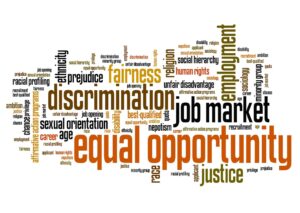
In this blog post, we’ll discuss the top 10 types of employment discrimination and how employees can protect their rights. Contact PLBH at (800) 435-7542.
1. Race Discrimination
Race discrimination involves treating an employee unfavorably because of their race or ethnicity. This can include discriminatory hiring practices, unequal pay, and harassment based on race or ethnicity.
2. Sex Discrimination
Sex discrimination involves treating an employee unfavorably because of their sex or gender. This can include discriminatory hiring practices, unequal pay, and harassment based on sex or gender.
3. Age Discrimination
Age discrimination involves treating an employee unfavorably because of their age. This can include discriminatory hiring practices, unequal pay, and harassment based on age.
4. Disability Discrimination
Disability discrimination involves treating an employee unfavorably because of their disability or perceived disability. This can include discriminatory hiring practices, unequal pay, and failure to provide reasonable accommodations.
Pregnancy Discrimination
Pregnancy discrimination involves treating an employee unfavorably because of their pregnancy, childbirth, or related medical conditions. This can include discriminatory hiring practices, unequal pay, and failure to provide reasonable accommodations.
National Origin Discrimination
National origin discrimination involves treating an employee unfavorably because of their country of origin or ethnicity. This can include discriminatory hiring practices, unequal pay, and harassment based on national origin.
Sexual Orientation Discrimination
Sexual orientation discrimination involves treating an employee unfavorably because of their sexual orientation. This can include discriminatory hiring practices, unequal pay, and harassment based on sexual orientation.
Religious Discrimination
Religious discrimination involves treating an employee unfavorably because of their religion or religious practices. This can include discriminatory hiring practices, unequal pay, and failure to provide reasonable accommodations.
Marital Status Discrimination
Marital status discrimination involves treating an employee unfavorably because of their marital status. This can include discriminatory hiring practices, unequal pay, and harassment based on marital status.
Retaliation
Retaliation involves taking adverse action against an employee because they engaged in a protected activity, such as reporting discrimination or harassment, filing a complaint, or participating in an investigation.
If you’re experiencing any form of discrimination in the workplace, it’s essential to speak with an experienced employment law attorney who can help you understand your legal options and protect your rights. Contact PLBH at (800) 435-7542 for a free legal consultation with an experienced employment law attorney.
Remember, discrimination in the workplace is illegal, and employees have legal options to protect their rights. If you believe you have been the victim of employment discrimination, don’t hesitate to contact an experienced employment law attorney who can help you understand your legal options and fight for your rights. Contact PLBH at (800) 435-7542 for a free legal consultation.
